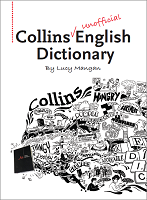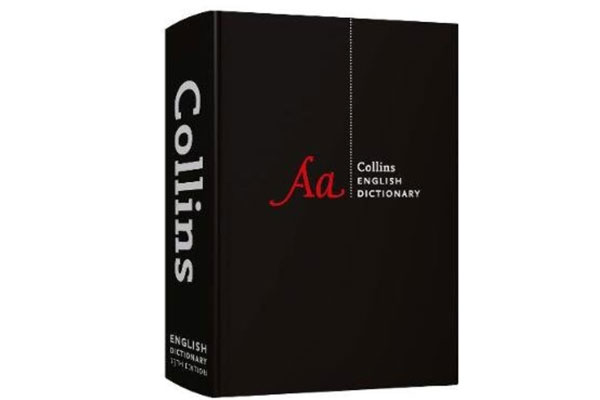It’s word nerd Christmas, folks! Which is to say, the new Collins English Dictionary is almost here! Nearly three quarters of a million words (50,000 newly added) in one rather classy-looking volume – or as a Kindle ebook or iOS app, I am reliably informed while still being not completely, actually, copper-bottomed certain what the latter is.
The words comprise those drawn from the Collins Corpus of 4.5 billion words – if you laid them end to end then, unlike Dorothy Parker, I would be a bit surprised because it would be a terrifically difficult thing to do, but I would admire it wholeheartedly nevertheless – and a selection of emerging terms submitted by you via collinsdictionary.com and supported by Corpus evidence. We thank you very much for all of those. You’ve enabled us to capture the present state of language usage better than ever before.
Scrabble players, you have not been forgotten. This is the only dictionary to include words previously only found in the official Scrabble wordlist, so that you may smash your opponents into dust with greater ease. You’re welcome. I can’t play Scrabble very well myself – I cannot resist putting down the longer/prettier/more interesting word instead of “ZO” on a triple. Yes, even if I can get “OX”, or another “ZO” at the same time. I’m that bad. I have the strategic strength and tactical ability of – well, a particularly dense member of a certain Tibetan breed of cattle, developed by crossing the yak with common cattle, say.
As you might deduce from my attitude to competitive word games, for me the dictionary is more a symphony of serendipity than a manual for practical use. Look how here, on page 796, you can discover that a “gambrel” is a horse’s hock or a wooden or metal frame of the same shape from which butchers hang carcasses. Hence “gambrel roof” – a hipped roof, making a similarly canted shape. Wait – is that the right use of canted? Here we are – page 302, “cant”. What’s the first of – yikes, ten! – uses? “An inclination from a vertical or horizontal plane; slope; slant.” That’s a relief.

Just above it is “canstick” – an obsolete form of “candlestick” and a few places below it is “cantabank” – an itinerant singer, one of the 50,000 new entrants in this edition and which, amongst other things, you can hear me and author and word nerd’s word nerd Mark Forsyth (who has written an introductory essay for the book about the joy of dictionaries and what makes a word a word) discussing in the BookD podcast in a few days. Do come and hear us do more of the same at the Piccadilly branch of Waterstones on October 23rd. Everyone there (plus the first 100 people to buy a copy of the dictionary at Collins.co.uk) gets a free copy of the little Unofficial Dictionary I wrote, which contains a selection of the words which didn’t quite make the final cut but seemed to deserve some kind of recognition for their work. Yes, I believe words have feelings. Again, this is why I am such a bad Scrabble player. You’re not free to strategise when you’re worried about the emotional health of your vowels. And “Q” is so needy. So unwanted. So resented, so altogether vulnerable without a “U”. It breaks my heart.
We can talk more about this on the 23rd, if you like. Do come, and bring your favourite and least favourite words with you. Typographer Oli Frape will be there to illustrate them for you and I will mine Mark Forysth’s mighty mind for their history and starring roles in English prose and poetry. Can’t wait to see you there. Merry Christmas!
Lucy Mangan, award-winning journalist, word-nerd and Collins blogger



